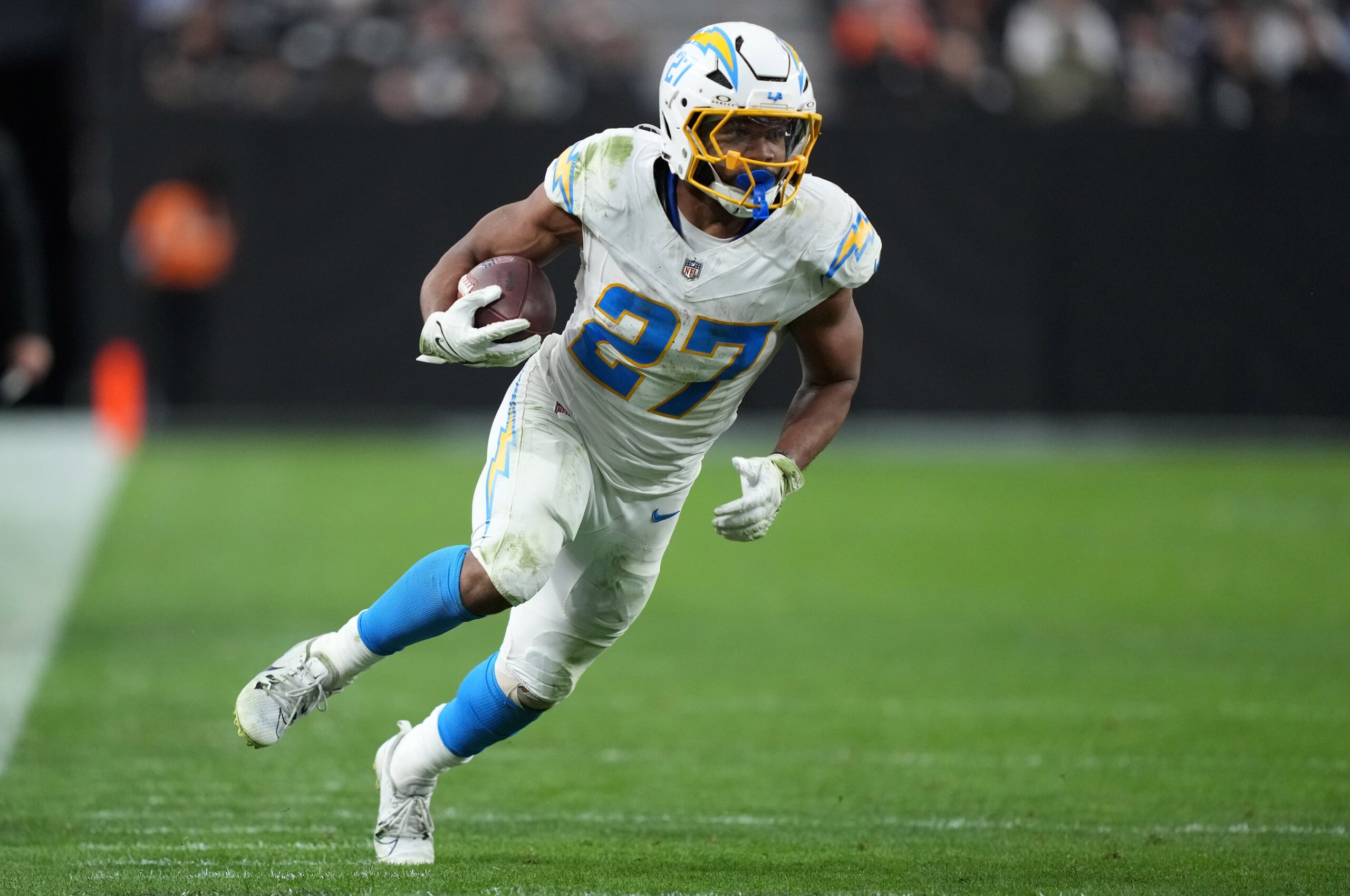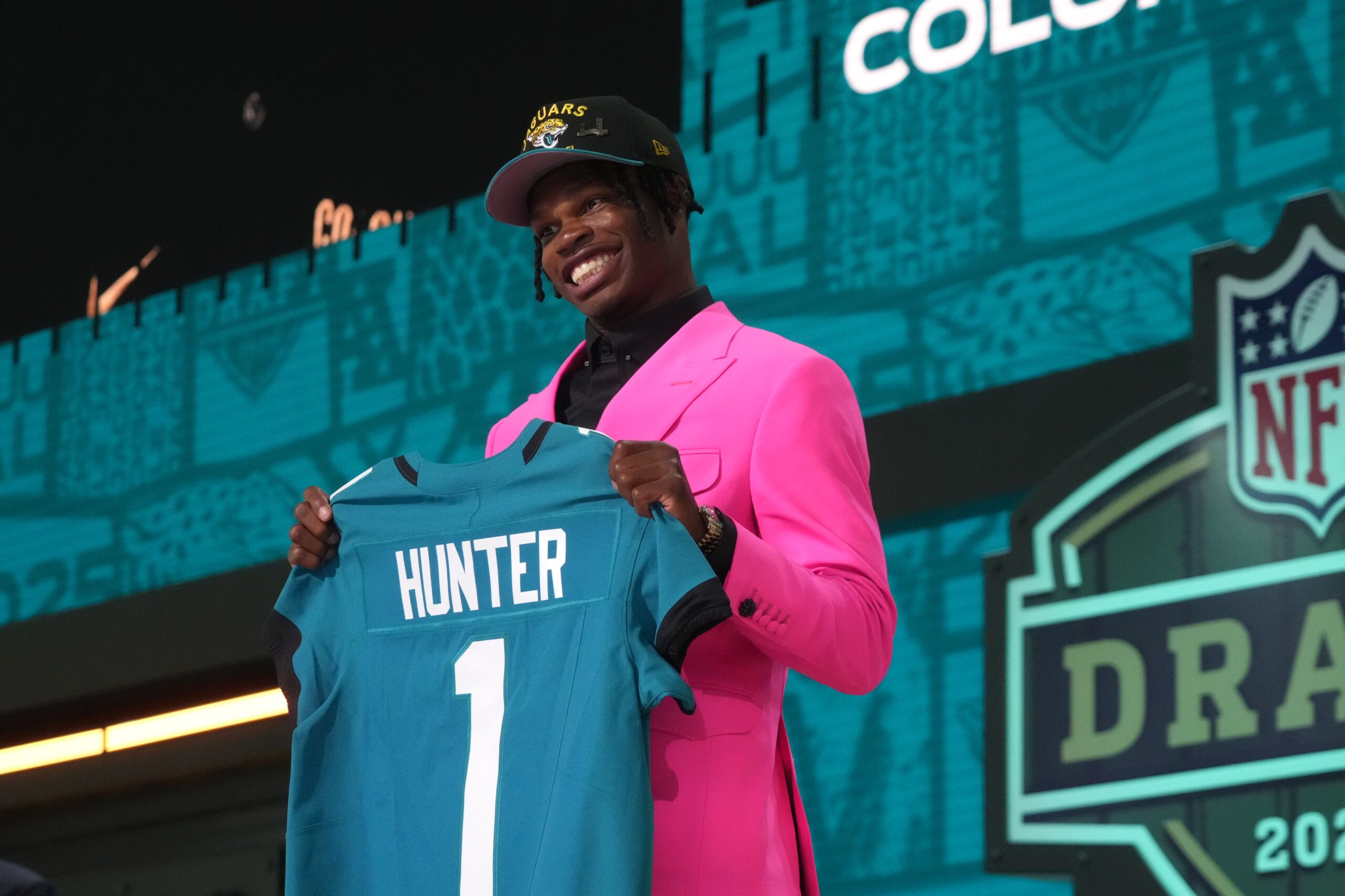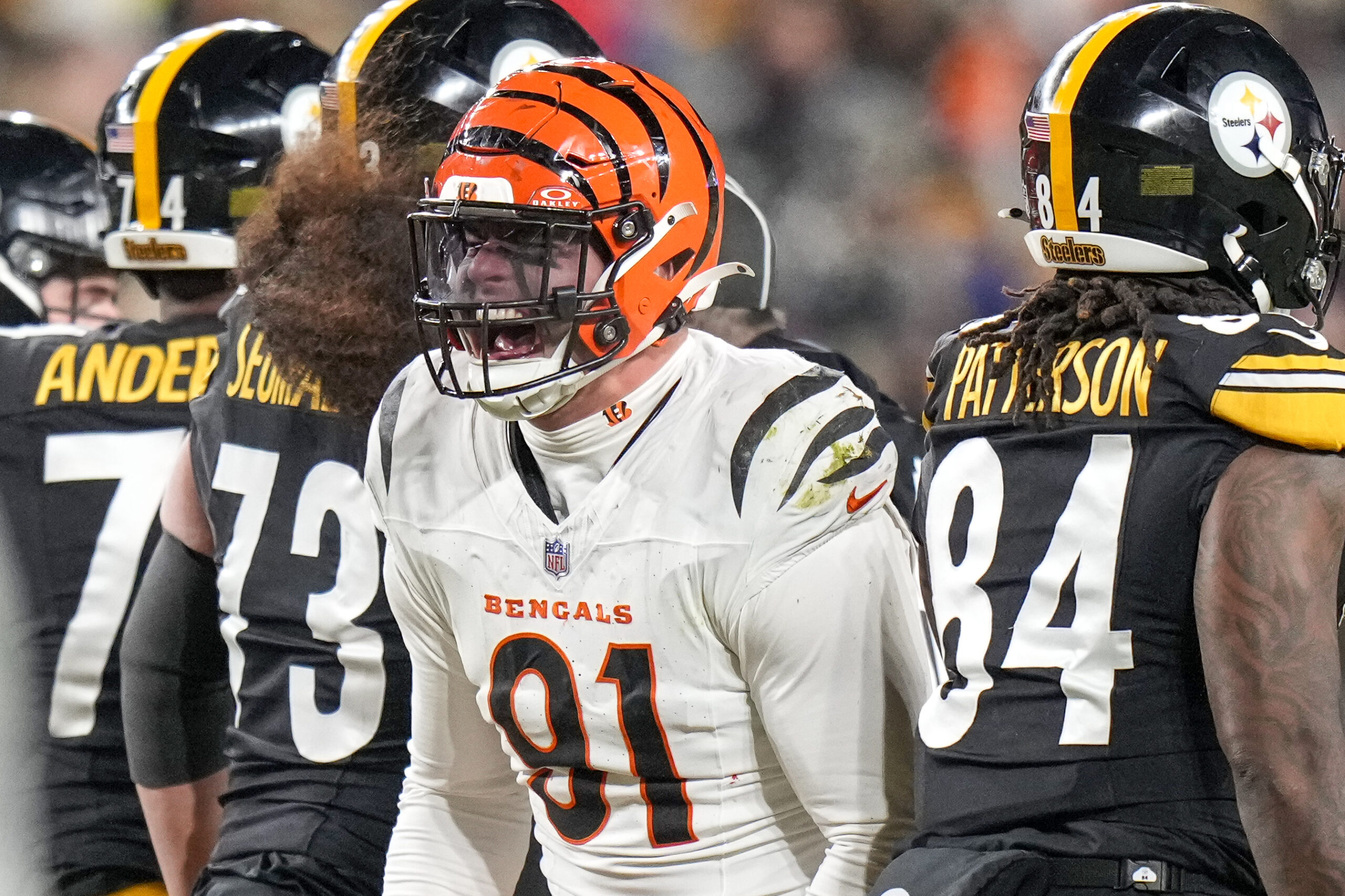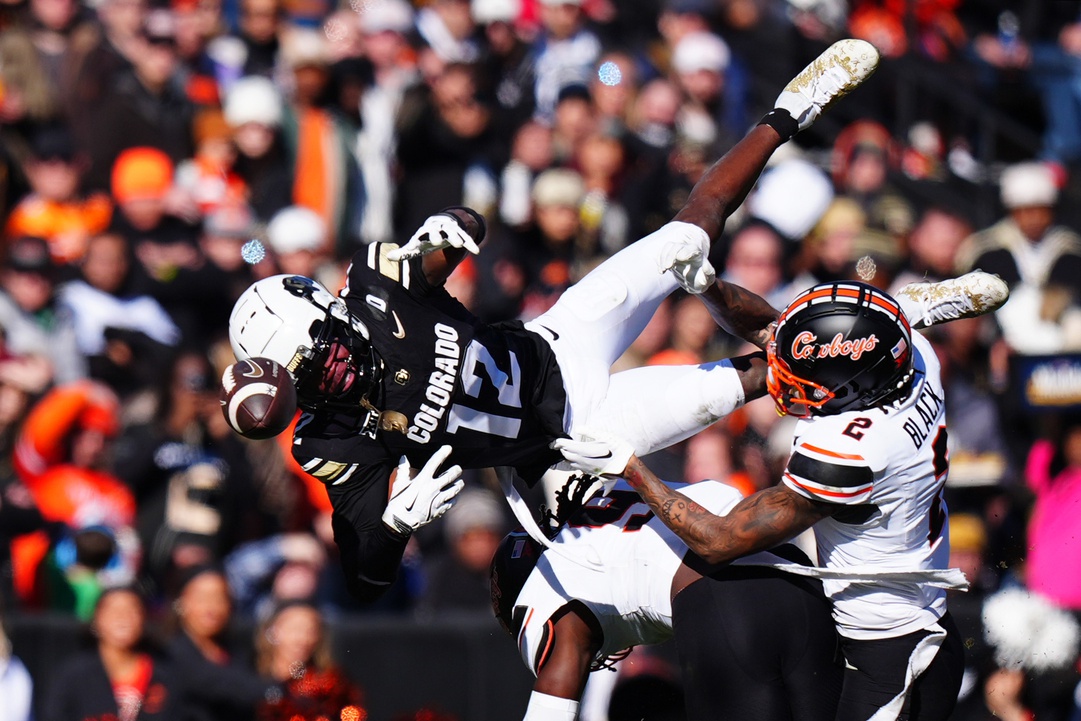NFL Analysis
12/29/23
13 min read
How Much Blame Does Jalen Hurts Deserve for Eagles’ Recent Struggles?
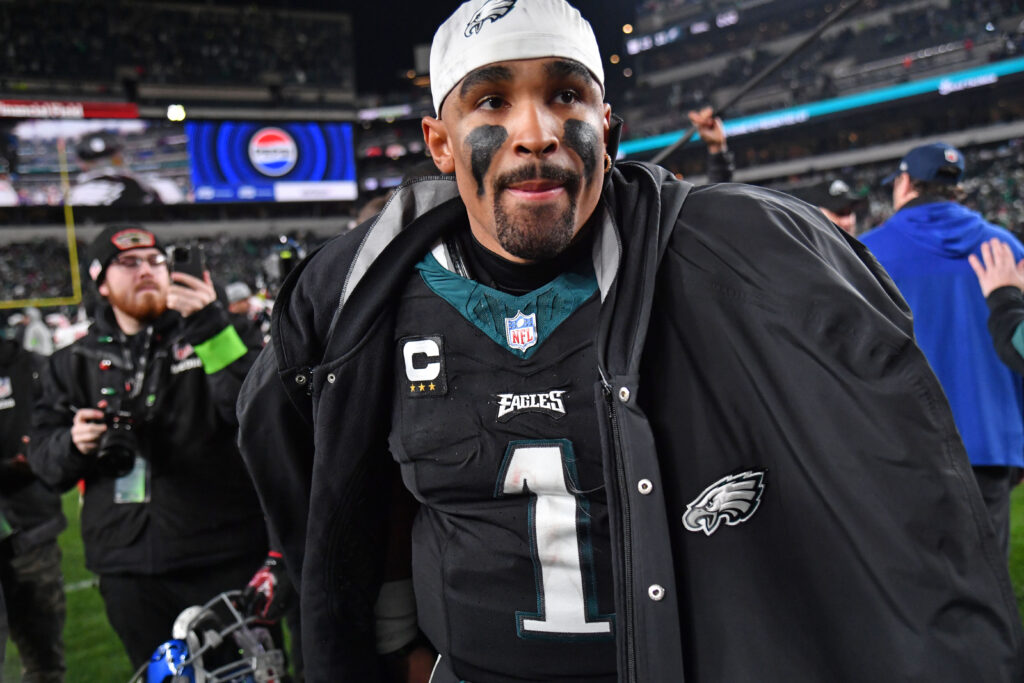
Since the day Jalen Hurts was selected by the Philadelphia Eagles in the second round of the 2020 draft, his career has essentially traveled in just one direction. And that’s been up, up, up.
From being a backup to Carson Wentz and an occasional gadget player to starting quarterback, to franchise quarterback, to MVP runner up, to scoring four touchdowns in the Super Bowl, to signing a five-year, $255 million contract last April.
But his fourth NFL season hasn’t been nearly as smooth as his third. While the Eagles are tied for the best record in the NFC and already have locked up a playoff berth, Hurts has not played nearly as well this season as he did last year.
Turnovers More Of A Problem
It starts with the turnovers. Eighteen of them. Thirteen interceptions and five lost fumbles. That is tied for the third most in the league. A year ago, Hurts turned the ball over just eight times. He had the fifth best interception percentage in the league, averaging one every 76.7 pass attempts. This year, he's tied for 23rd while throwing one every 38.4 attempts.
“Not every turnover has been Jalen’s fault,’’ said Mike Quick, the former All-Pro wide receiver and longtime Eagles radio analyst. “But the bottom line is he’s turned the ball over at an alarming rate.
“That’s such a huge factor in winning and losing. You can’t give teams extra opportunities to score points. And that’s basically what you’re doing when you turn the ball over. You’re taking away your opportunity to score and giving it to them.”
Quick doesn’t know why Hurts is turning the ball over so much more. He just knows that he is.
“There are games where he’s really sharp and makes all the right decisions with the ball,” he said. “I thought that’s the way he was last week against the Giants (a closer-than-it-should-have-been 33-25 win). I thought his decision-making was almost perfect in terms of all of the options within a play and making the right decisions within those options.
“But there’s been other times during the season where his decision-making hasn’t been as good.”
Numbers Up, Numbers Down
Many of Hurts’ passing numbers are down this season. His passer rating has dropped from 101.4 to 89.6. His yards-per-attempt average has dropped from 8.0 to 7.3. His touchdown percentage has dropped from 4.8 to 4.0. A guy who entered the season as the favorite to win the MVP is ranked a distant seventh right now according to the betting odds.
But he has improved in other areas, most notably on third down and in the red zone. The Eagles have the league’s second best third-down success rate (48.8), up from 46.0 last year. Hurts’ third-down passer rating has jumped from 93.0 last year to 98.2 this year. His third-down completion percentage has improved from 62.6 to 67.2.
While the Eagles haven’t been as efficient in the red zone this season (58.9 touchdown percentage compared to 68.0 last year), Hurts’ red zone passer rating jumped from 88.7 last year to 106.9. His red-zone completion percentage has improved from 50.0 to 58.3.
For the first nine games, Hurts and the Eagles’ offense was sailing along fairly smoothly. The Eagles won eight of those nine games and their quarterback had a 97.0 passer rating that included a 68.8 completion percentage, 7.7 yards per attempt, 15 touchdown passes and eight interceptions.
But in the last six games, including back-to-back-to-back losses to the 49ers (42-19), Cowboys (33-13) and Seahawks (20-17), Hurts has a 77.9 passer rating and a 60.3 completion percentage. He’s averaged just 6.6 yards per attempt and has thrown just five touchdown passes in nearly 200 attempts in those six games.
Nobody realizes Hurts isn’t playing as well as he needs to more than Hurts.
“Everyone has their own preconceived notion on something,’’ the quarterback said this week. “A lot of people are going to tell you how to handle something that they’re not in that position.
“I know I personally have been looked at like that for a long time. Because there’s a value in losing. That does something to you. As a competitor, it drives you, pushes you forward. You don’t really feel those feelings you felt when you came up short in situations. Every competitor is different. Every competitor handles and channels different emotions in different ways.
“How we come back as a team, as long as we’re doing it together, as long as we’re on the same page, that’s all that matters. I just want to continue to grow through these experiences, grow from the lessons we’ve had in the last month, and channel it in the right way for us as a team so we can be successful.”
The Eagles returned nine of 11 starters from an offense that finished third in the league in scoring and total yards and put up 35 points and 417 yards on the Chiefs in Super Bowl LVII last February.
The expectation was they would be even more dominant this season. But that hasn’t been the case. The Eagles are averaging two points and 26 yards per game less than last year. Defensive coordinators spent a lot of offseason hours trying to figure out how to slow down the Eagles’ diverse offense.
Eagles Not As Good As A Team
Last year, they put teams away in the first half. Philadelphia had a league-best plus-121 first-half point differential and averaged 12.2 points in the second quarter alone. This year, they’ve been outscored in the first half 186-180 and trailed at the half in six straight games at one point. Last year, they trailed at the half just three times across the entire season.
“Jalen isn’t playing as well as he did a year ago,” said 2002 league MVP Rich Gannon, an analyst for The 33rd Team. “But the rest of the team hasn’t played as well around him either. I’m not just talking about the offense. I’m talking about the defense as well.
Jalen (Hurts) isn’t playing as well as he did a year ago. But the rest of the team hasn’t played as well around him either.
The 33rd Team analyst Rich Gannon
“The defense kicked the crap out of everybody a year ago. They had 70 sacks. The second-quarter scoring differential was such a big number that they went into halftime with big leads and then came out in the second half and ran the ball. They bullied people with the run game and then defensively, they just went after the quarterback and took away the ball.
“But that situation just really hasn’t existed this year. The yards have been harder to come by rushing the football. They haven’t been nearly as dominant running the ball as they were a year ago.”
That particularly goes for Hurts. While he’s been unstoppable on the Tush Push sneaks, defenses often have bottled him up on designed runs and zone reads. His rush average has dropped from 4.6 yards per carry last year to 3.9 this year. By the same token, he has 15 rushing touchdowns, including 11 on Tush Pushes.
The Eagles’ defense has been awful this season. Five starters were lost to free agency. Their valuable slot corner, Avonte Maddox, tore his pectoral in September and has played in just two games. Cornerbacks James Bradberry and Darius Slay haven’t played nearly as well as they did during the Eagles’ Super Bowl run. They lack depth at edge-rusher. Their two first-round defensive tackles, Jalen Carter and Jordan Davis, aren’t playing nearly as well as they did earlier in the season when they had fresh legs.
The Eagles are 25th in points allowed (24.4), have given up 31 touchdown passes already (second most in the league) and are 30th in third-down defense (46.4 percent) and 29th in red-zone defense (68.1 percent).
“The defense has been a big disappointment,” Gannon said. “Their linebackers have been a liability in coverage. The corners haven’t played well. The nickel position has killed them without Maddox in there. They haven’t been able to stop anybody when it comes to the pass. And that has an effect on the offense. Because instead of going out and scoring 24 points, you’ve got to score 35.”
Last year, when the Eagles scored a franchise-record 207 points in the second quarter, Hurts had a 113.0 second-quarter passer rating. Averaged 9.1 yards per attempt and threw 11 TD passes and just two interceptions. This year, his second-quarter passer rating is 82.0. He’s averaging 6.9 yards per attempt in the second quarter.
In the Eagles’ last six games, including those losses to the 49ers, Cowboys and Seahawks, Hurts has a 53.8 passer rating in the second quarter, including a 46.7 completion percentage and 5.8 yards per attempt.
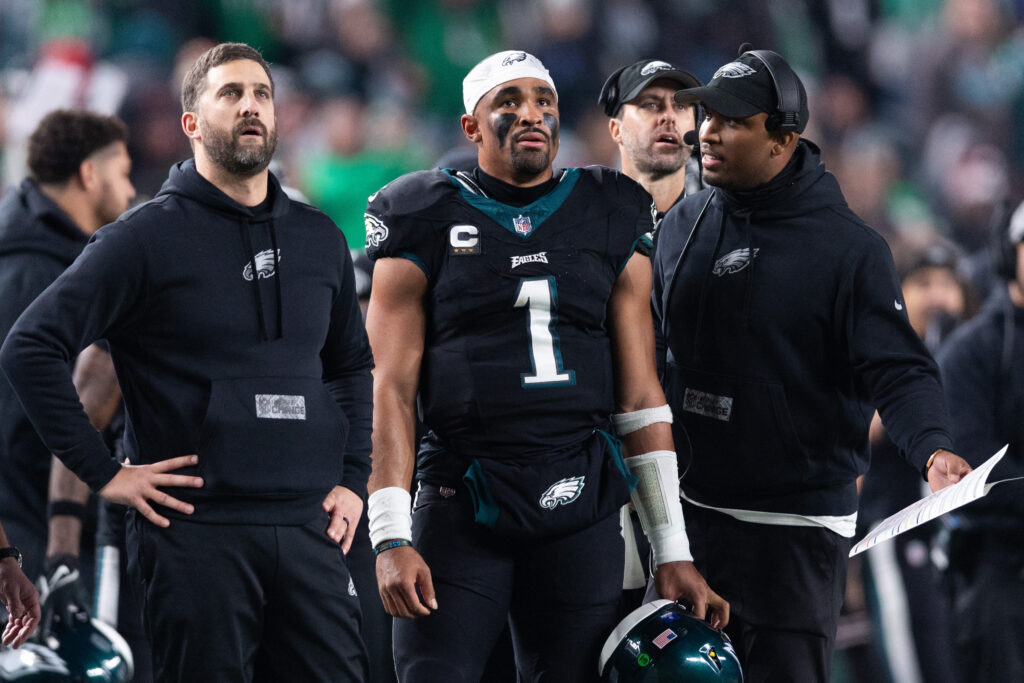
Transition Has Been Bumpy
When offensive coordinator Shane Steichen left after the season for Indianapolis and was replaced by quarterbacks coach Brian Johnson, everyone anticipated a smooth transition. Johnson has known Hurts since he was four years old. He spent the last two years as Hurts’ position coach.
But the relationship between a quarterback and his position coach and a quarterback and the offensive coordinator aren’t the same. And it’s been pretty clear that there have been some growing pains.
“When you’re the quarterbacks coach you’re a helper,” Gannon said. “You spend a lot of time with the footwork and the mechanics and doing drills and being an extra set of eyes and answering questions the quarterback has.
“But the coordinator, the play-caller, is spending so much time with the quarterback talking about situational football, talking about protections, talking about why we’re calling things in certain situations, like, these are my top 4-5 calls on third-and-2 to 4. Which ones do you like? Which ones don’t you like?
“You’re spending a lot of time together so you can get on the same page. If you’re the play-caller, you want to see the game through the eyes of the quarterback. You want to know what the quarterback’s strengths are and be able to accentuate that. But you also want to know what the quarterback’s deficiencies are so that you can work around that. If he’s not good at certain things, then we’re not going to do those things.
“When you’re the play-caller, there’s a growth period where you’re learning those things. Now, he certainly has an advantage because he’s known Jalen for a long time and has been in the building working with him for the previous two years. But there still are growing pains. Shane Steichen did a real nice job last year. They went to the Super Bowl, and the expectations were that they were going to go back. They’re 11-4, but it hasn’t been easy. And the fact of the matter is most teams don’t make it back to the Super Bowl the next year.”
Johnson has been a frequent object of criticism by talk show callers and social-media ranters for the offense’s inconsistent play this season.
“I think Brian, for the most part, has done a really good job with the play-calling,” Quick said. “There are plays that I don’t like, like everybody else. Those bubble screens to the wide receiver when they’re blitzing and everybody in the stadium knows it’s coming, I’m surprised somebody hasn’t picked one of those off for a Pick 6 yet. There are elements of this offense that could stand an overhaul. But for the most part, this is a tough offense to defend.”
I know this guy very well. He’s tough-minded. He doesn’t flinch at anything.
The 33rd Team analyst Marty Mornhinweg, who spent 2020 season as a senior offensive consultant with the Eagles in charge of developing Hurts.
“When you hire or promote a new coordinator, there absolutely is a transition,” said The 33rd Team analyst Marty Mornhinweg, who spent 26 years as an NFL coach, including the 2020 season as a senior offensive consultant with the Eagles in charge of developing Hurts.
“Sometimes it’s smooth as silk. Other times not so much. I’m not sure that’s the issue there. I’m not sure there’s any issue with the exception of the turnovers. And that’s correctable. Jalen understands deeply that that turnover ratio wins games for you.
“I know this guy very well. He’s tough-minded. He doesn’t flinch at anything. He’s built to motor through a little adversity. Their challenge right now is to get back to playing their very best in these last two weeks of the regular season. They finish with the Cardinals and Giants again. Those are two pretty good opportunities to getting back to playing your best.”
One thing Hurts needs to do a better job of is spreading the ball around. In their Week 14 loss to the Cowboys, he targeted just three players — wide receivers A.J. Brown and DeVonta Smith and tight end Dallas Goedert. He seems to loathe checkdowns to running backs D’Andre Swift and Kenneth Gainwell, even though Swift and Gainwell are two of the league’s better pass-catching running backs.
Too often, Hurts is obsessed with throwing the deep ball to Brown or Smith. They’ve been very successful with it, but five of Hurts’ 13 interceptions have come on 20-plus-yard throws.
“It’s never good to target just 2-3 guys,” Quick said. “When you do that, you are, without even looking at all of the details of every play, forcing the ball in places where the ball shouldn’t go. I’ve always been taught, and have always believed, that the defense tells you where to go with the ball. You take what the defense gives you, simply put.
“Jalen did a good job of that in the Giants game last week. Taking the checkdown and getting it to someone rather than holding on to it. But there have been numerous times this season where that hasn’t happened, and he’s tried to get it down the field for a bigger play and has put the ball in harm’s way.
“The game is about the quarterback. Your quarterback play is so important. When your quarterback play suffers, then, as a team, you’re going to suffer.”
Your quarterback play is so important. When your quarterback play suffers, then, as a team, you’re going to suffer.
Eagles radio analyst Mike Quick
Said Gannon: “There’s so many things to like about Jalen Hurts. He’s tough. He’s competitive. He’s got great leadership skills. I think he’s an instinctive guy. I think he can create and manufacture plays. I think he does a lot of things well. But like all of us, there are things he can get better at.
“One of the things I would work on with him is being a master of his domain when it comes to protections and calls and concepts and being more involved in that part of it. Word gets around when you struggle with protection. Coaches watch film. They talk to one another. They’ll tell each other, hey, he’s not doing a very good job of handling this stuff.
“Jalen has the benefit of playing behind one of the best offensive lines in football. But they’ve left some offense on the field because of an inability to handle and convert some of those situations.”


